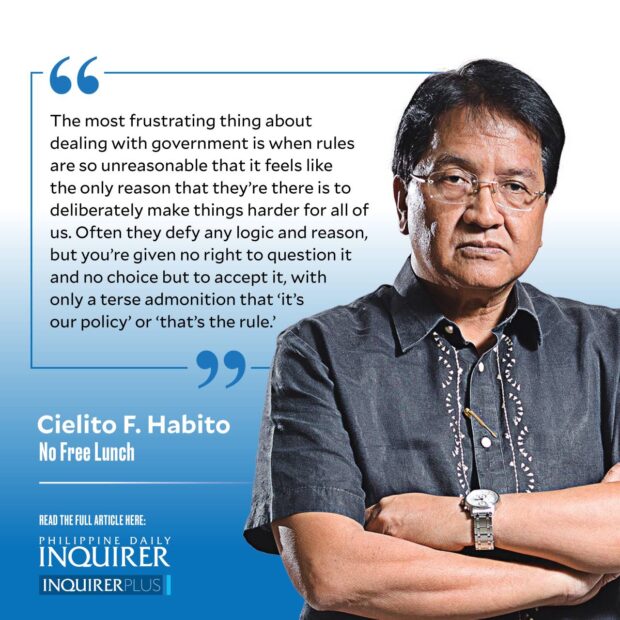When rules defy reason
 The most frustrating thing about dealing with government is when rules are so unreasonable that it feels like the only reason that they’re there is to deliberately make things harder for all of us. Often they defy any logic and reason, but you’re given no right to question it and no choice but to accept it, with only a terse admonition that “it’s our policy” or “that’s the rule.” I’ve written on this so many times in various contexts over the years, most of them based on firsthand experience or observation.
The most frustrating thing about dealing with government is when rules are so unreasonable that it feels like the only reason that they’re there is to deliberately make things harder for all of us. Often they defy any logic and reason, but you’re given no right to question it and no choice but to accept it, with only a terse admonition that “it’s our policy” or “that’s the rule.” I’ve written on this so many times in various contexts over the years, most of them based on firsthand experience or observation.
My family’s latest travails with illogical rules and requirements were not with our own government, but that of another Asian country, through their embassy in Manila. Our family members all had to apply for entry visas to South Korea, where my son is soon to marry his long-standing fiancée, a Korean. My daughter who has been living in Boston with her American husband and two children had to take a difficult flight home with her two small kids in tow, to apply for her visa here. The Korean consulate in Boston refused to issue a visa to a non-United States citizen unless the applicant has lived in the US for at least two years. No amount of explanation of her peculiar circumstances from her and my son’s Korean bride-to-be could budge them from their insistence that the only way was for her to fly home and apply for her visa here. “That’s the rule,” they told her.
On filing her application with all the listed documents required, she was suddenly asked to submit a Philippine Statistics Authority-certified copy of the birth certificate of her brother—and it had to be the original from PSA. We asked why they couldn’t just cross-reference the visa application of our son, who had already submitted his PSA-certified birth certificate earlier. The Korean embassy, unlike others, does not return any documents submitted with visa applications. Others only ask to see the original certified copy (which costs time and money to obtain) without taking it, only requiring submission of a photocopy. But they insisted she had to submit a separate original copy, again. “That’s the rule,” they said.
On the appointed release date, we discovered that the claim slip had been misplaced, so my daughter made the long trip from our home in Los Baños to the embassy to claim the visa herself, using a photo of the claim slip she had taken earlier on her phone. But the embassy insisted on the original claim slip. The only way, she was told, was to obtain a police report and a notarized affidavit of loss—never mind that she was the applicant herself, complete with identification. (The lawyer laughingly told her this was the first time she was to issue an affidavit of loss for something so seemingly trivial.) We couldn’t fathom why that little slip of paper would matter more to the embassy than the presence of the applicant herself. Whoever presents that slip would actually be given the passport and visa, no ID required, and no questions asked, even if it’s conceivable that the claimant could have just found or even stolen it. “That’s the rule,” she was told again. Strike three.
I guess our government is not alone in imposing unreasonable and often expensive requirements. But here, it seems to happen everywhere you look. I’ve told of the Laguna Lake Development Authority’s insistence on the physical submission of application documents for their permits even when the pandemic lockdowns severely restricted everyone’s mobility (“Obstructionist vs. enabling,” 7/12/22). Then there are the Philippine National Police clearances that are required at the provincial, regional, and national levels, each being an entirely distinct process. When our staffer pleaded at the national office that she had to travel all the way from Laguna, they told her she was lucky; other applicants were coming from Mindanao! And then there’s that perennially notorious “medical exam” for drivers’ licenses at the Land Transportation Office, where even the recently mandated ceiling of P300 is still highly overpriced, considering that it’s little more than a dubious eye test.
All told I’m led to believe that bureaucrats’ minds are programmed to believe that nothing should come easy—and that there’s something wrong if they do.




















